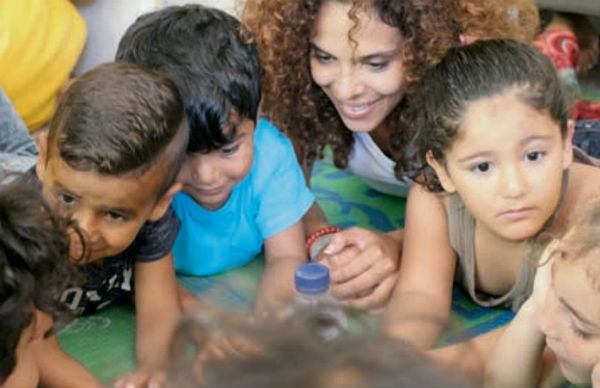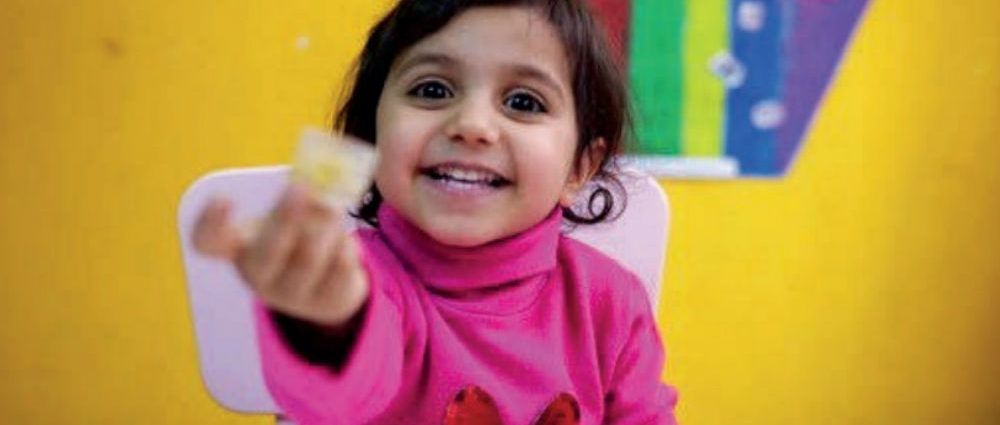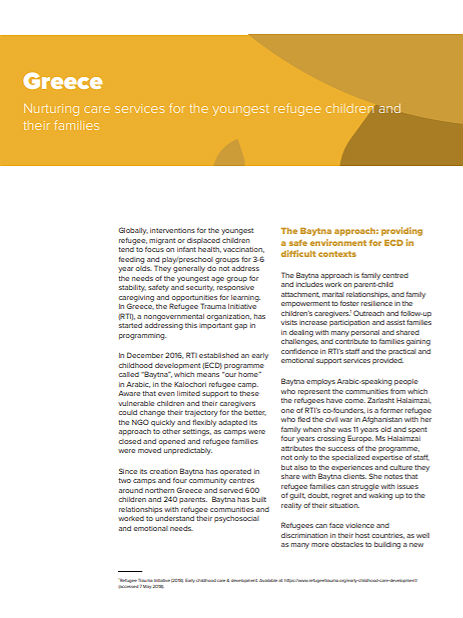Globally, interventions for the youngest refugee, migrant or displaced children tend to focus on infant health, vaccination, feeding and play/preschool groups for 3-6 year olds. They generally do not address the needs of the youngest age group for stability, safety and security, responsive caregiving and opportunities for learning. In Greece, the Refugee Trauma Initiative (RTI), a nongovernmental organization, has started addressing this important gap in programming.
In December 2016, RTI established an early childhood development (ECD) programme called “Baytna”, which means “our home” in Arabic, in the Kalochori refugee camp. Aware that even limited support to these vulnerable children and their caregivers could change their trajectory for the better, the NGO quickly and flexibly adapted its approach to other settings, as camps were closed and opened and refugee families were moved unpredictably.
Since its creation Baytna has operated in two camps and four community centres around northern Greece and served 600 children and 240 parents. Baytna has built relationships with refugee communities and worked to understand their psychosocial and emotional needs.
The Baytna approach: providing a safe environment for ECD in difficult contexts
The Baytna approach is family centred and includes work on parent-child attachment, marital relationships, and family empowerment to foster resilience in the children’s caregivers.1 Outreach and follow-up visits increase participation and assist families in dealing with many personal and shared challenges, and contribute to families gaining confidence in RTI’s staff and the practical and emotional support services provided.
Baytna employs Arabic-speaking people who represent the communities from which the refugees have come. Zarlasht Halaimzai, one of RTI’s co-founders, is a former refugee who fled the civil war in Afghanistan with her family when she was 11 years old and spent four years crossing Europe. Ms Halaimzai attributes the success of the programme, not only to the specialized expertise of staff, but also to the experiences and culture they share with Baytna clients. She notes that refugee families can struggle with issues of guilt, doubt, regret and waking up to the reality of their situation.
Refugees can face violence and discrimination in their host countries, as well as many more obstacles to building a new life, including services that do not address their social and emotional needs and cultural dislocation. Many of the questions parents ask of the Arabic-speaking Baytna staff are about holding on to a piece of their homes and their selves. Will their children lose their identity? Will they forget their culture Will they be okay? An ECD approach allows Baytna staff to work with the whole family and to provide resources supporting parents’ focus on their children’s needs, as well as give them an opportunity to tackle painful subjects and even taboo issues.
Engaging parents and caregivers in this way is a key part of the intervention to help refugee parents care for, and protect and build resilience in their children.

Baytna’s support groups
Baytna’s central, overarching aim is to provide a safe environment to support pregnant women, and the youngest refugees and their families. The programme includes three different support groups for: pregnant women, mothers and children aged 0–1 year; parents and children aged 1-3 years; and parents and children aged 3-5 (sometimes 6) years.
Pregnant women and mothers with infants meet twice weekly to share experiences, interact with others and learn more about pregnancy and child development. The areas of focus include:
• helping parents understand children’s development stages;
• explaining how traumatic experiences can impact on their child’s development and behaviour;
• enhancing sympathy and empathy through better understanding their child and his/her needs;
• helping mothers to understand and be aware of their own needs and challenges;
• helping pregnant women to understand physical and emotional changes during pregnancy and be aware of healthy approaches to pregnancy; and
• supporting new mothers with the challenges presented by breastfeeding, emotions, marital relationships, etc.
Toddler groups meet at least once a week depending on the site. The sessions provide a safe environment with lots of toys where mothers can have quality interactions with their child and share experiences with other mothers. In addition, an expert is on hand to discuss how children might respond to what they have been through and how they can best support and maintain their own well-being. When women in one toddler group were asked to share lullabies, one mother began crying when she realized that, because of the stressful conditions she had experienced in her baby’s first three months, she had not yet sung him a single lullaby.
Baytna not only provides a nurturing environment for children, it also gives families a place to draw breath, regroup and refocus their energies on nurturing their children and rebuilding their lives.
Making a difference
To assess Baytna’s results in its first year, attendance and retention were measured, semi-structured interviews were conducted and the progress of regularly attending children was observed. The results showed a clear association between attendance and developmental progress for children as well as empowerment of primary caregivers.2 Mothers who had participated more reported higher levels of well-being among their children, including “improvement in the capacity to self-regulate, relate to others and feel more secure”. Structured interviews also revealed that the children were engaging and sharing more with other children; they were less aggressive and better able to sustain concentration.
Women said they were more able and willing to communicate and play with their child and that their family was interacting in a calmer, more relaxed way. The more frequently children attended sessions at Baytna, the greater was their gain in cognitive, social, emotional and physical abilities. Some children who attended regularly demonstrated at least five or more skills in addition to the skills benchmarked for their age group. This means that a 3-year-old refugee child demonstrated the emotional, social and cognitive skills of a child older than 3.
Additionally, outreach and follow-up visits to the families’ home were a key contributor to success. In the assessments, parents reported that these visits helped them to maintain daily routines, feel supported and become more motivated to participate in the programme.
Looking forward
The need for nurturing care services for young refugee children and their families remains immense: at present RTI is the only provider of specialist ECD services in northern Greece. RTI is currently in the process of opening a refugee day care centre, through a partnership with the Municipality of Thessaloniki. In partnership with the International Step by Step Association, the Greek Ministries of Education, Religious Affairs and Technology, and others, RTI will provide training for psychosocial support and ECD to nursery school and kindergarten teachers in refugee camps. Resources permitting, Baytna will do more to engage with fathers and will create new development opportunities for families who are staying in Greece, including potentially offering training to refugees so that they can lead future early education programmes.
Endnotes
1 Refugee Trauma Initiative (2018). Early childhood care & development. Available at: https://www.refugeetrauma.org/ (accessed 7 May 2018).
2 Refugee Trauma Initiative. (December 2016 – December 2017) Baytna Annual Report. Internal Report, available on request.
Acknowledgements
This profile was developed in support of Nurturing Care for Early Childhood Development. A framework for helping children to survive and thrive to transform health and human potential.
Writers: Kolleen Bouchane and Zarlasht Halaimzai
Contributors to development and review: Matthew Frey, Bettina Schwethelm. Design: PATH.






